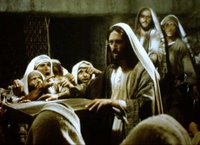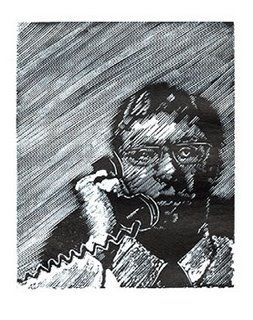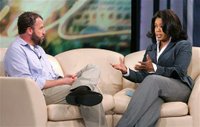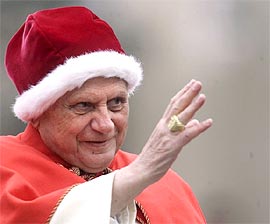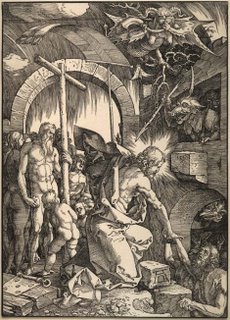
How many ways can you ruin a kiss? Or a handshake? Or a warm embrace?
Plenty, if you're a priest who doesn't keep up with the latest in the General Instructions!
The "Sign of Peace" was added to the Mass during the reforms that came out of Vatican II. The idea is simple. There are many ways that we recognize Christ at Mass. He is found in the Holy Word of Scripture; he is represented by his ordained minister, the priest; he is found in the Eucharistic elements; and he is found in each of us.
The Tridentine Mass recognized only the vertical elements of our relationship to Christ -- those that related us to him in his Divinity. Christ as Word, Sacrament and sacred minister fit that bill. But what about the horizontal dimension of our relationship to Christ -- the "me and you" version? The Sign of Peace was supposed to highlight (if only or a moment) that horizontal element.
Good call, Eminences!
But for the last 40 years, priests have done everything they can to screw up the Sign. Here are a couple of the classic ways:
The Speed Demon
Let's face it, it takes more than 10 seconds to greet all the people around you, especially if you attend Mass as a family. So when the priest intones "Let us offer one another a sign of Peace. Lamb of God..." then you are stuck. Do you stop shaking hands with those around you? What if you haven't Peaced your spouse yet?
You have the awkward choice of either cutting off the Peace, or of embracing people during the Distribution Rite (the Lamb of God) itself Not pretty. Mosty people choose to finish the Peace, but it is awkward!
Around the World!
The Sign of Peace is just that -- a sign. It's supposed to symbolize a greater reality. Giving the peace to those immediately around us stands for our desire (and duty) to give peace to all people.
So when the priest says, "Let us offer each other a sign of peace," he doesn't necessarily mean all the others. But occassionally, especially in small groups, that's what you get -- a "sign" that goes on and on until everyone has "peaced" everyone else. It's the kind of thing that gives liturgists fits: a part of Mass that inexplicably gets blown up or chopped down out of proportion to the rest of the Mass.
But in the grand scheme of things, it's the least of my worries.
A variation on this is the congregation that "does its business" while the presider who struts around shaking hands like a selectman on election day. What does it mean, one wonders, when the priest offers the peace to a few people in the front pews, but to no one else? Or to those along the middle aisle? If you're going to shake hands with some, why not all?
It all sounds silly and nitpicky until you relize that the Mass is like the hula -- every motion has a meaning. Mess with the motion and you mess with the meaning.
Pray tell, Father (who presides at Mass in persona Christi):When "Christ" leaves the sanctuary to shake the hands of a few fo the faithful, what is the message? I hope it's more than, "Im the priest! I can do what I want! Watch me as I loooove the people!"

